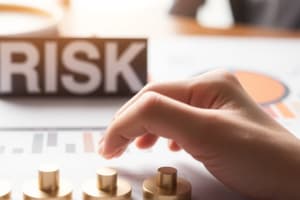Podcast
Questions and Answers
What is the definition of risk?
What is the definition of risk?
The possibility of something bad happening.
Which of the following is NOT a characteristic of risk identification?
Which of the following is NOT a characteristic of risk identification?
- Recognize the risk
- Describe the risk
- Support fact-based decision (correct)
- Find the risk
Risk management is only about preventing hazards.
Risk management is only about preventing hazards.
False (B)
Risk assessment starts primarily with risk ______.
Risk assessment starts primarily with risk ______.
Which principle is NOT part of effective risk management according to Philippine National Standards?
Which principle is NOT part of effective risk management according to Philippine National Standards?
Match the types of risks with their descriptions:
Match the types of risks with their descriptions:
Flashcards are hidden until you start studying
Study Notes
Risk Assessment Framework
- Risk assessment encompasses identification, analysis, and evaluation of risks faced by an organization.
- It is fundamental to understand the nature of risks, including their characteristics, sources, consequences, and likelihood of occurrence.
Definition of Risk
- Risk defines the possibility of negative occurrences impacting objectives, expressed through sources, events, consequences, and likelihood.
- The Philippine National Standard (PNS) describes risk as the effect of uncertainty on objectives.
Purpose of Risk Management
- Risk management aims to create and protect value across the organization while facilitating performance improvement, innovation, and global success.
- It serves as a proactive tool to prevent potential risks and hazards, enhancing the organization’s value chain.
Principles of Effective Risk Management
- Integrated into all organizational activities for seamless operations.
- Structured and comprehensive for consistent, comparable results.
- Customized to fit the specific external and internal contexts related to organizational objectives.
- Inclusive of stakeholder involvement, ensuring diverse knowledge and perspectives.
- Dynamic, with the ability to respond timely to changes in the environment.
- Based on the best available information, utilizing historical, relevant, and current data.
- Recognizes the influence of human and cultural factors on risk.
- Aims for continual improvement through experiential learning.
Risk Assessment Process
- Risk assessment is a systematic, iterative, and collaborative process involving stakeholder insights.
- Begins with risk identification, focusing on finding, recognizing, and describing risks.
Considerations in Risk Identification
- Evaluate both tangible and intangible sources of risk.
- Consider time-related factors, causes and events, biases, and assumptions.
- Identify threats, opportunities, vulnerabilities, capabilities, and changes in context.
- Monitor indicators of emerging risks and assess the nature and value of assets.
- Understand the potential consequences and impacts on organizational objectives.
- Acknowledge limitations in knowledge and reliability of information.
Types of Risks
- Compliance Risk: Linked to government-mandated licenses, business permits, and requirements.
- Hazard Risk: Risks that obstruct the achievement of company goals and objectives.
- Opportunity Risk: Risks that organizations may intentionally seek to foster long-term success.
- Control Risk: Risks associated with the capability of the organization to manage and mitigate risks effectively.
Studying That Suits You
Use AI to generate personalized quizzes and flashcards to suit your learning preferences.




